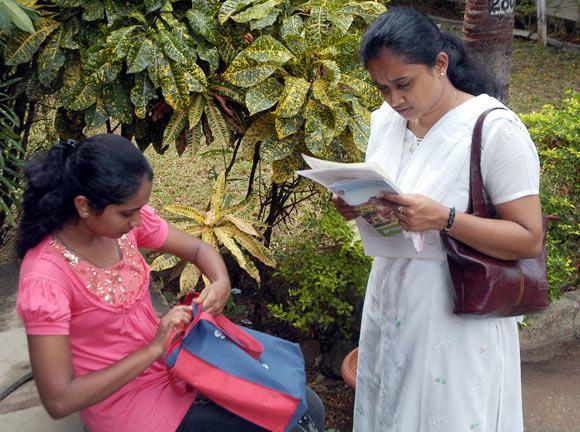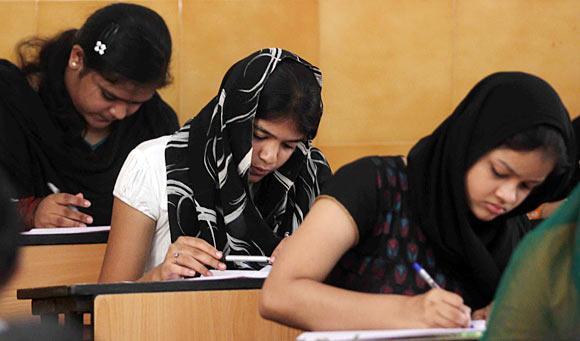 | « Back to article | Print this article |
Dos and don'ts to crack the JEE Advanced
Vivek Khanna, an IIT alumnus and education consultant based out of Mumbai tells you how you can optimise the time at hand to score well in the JEE Advanced.
Students who cleared the IIT-Joint Entrance Examination Mains on May 7 are qualified to appear for the JEE Advanced which will be held on Sunday, June 2, 2013.
Over 1,50,000 students qualified for the JEE Advanced this year.
According to the new pattern that was implemented last year, Class 12 board marks and JEE scores will carry 40 and 60 per cent weightage for engineering admissions respectively.
Here are a few tips for students appearing for the JEE Advanced this year:
Optimise your revision
Students should revise the notes written in the classrooms and go through the solutions of the problems they have solved earlier.
Revise and complete the most scoring topics first. For example in Physics, optics, thermodynamics, waves, modern physics and electromagnetism should be completed first.
Then you should shift to mechanics. In mathematics you should have a firm command on calculus and coordinate geometry first and only then should you shift to probability, vectors, complex numbers. In chemistry, physical chemistry should be mastered before inorganic and organic chapters.
For inorganic and organic, Class XI and XII school books are the best.
Reverse engineer while you study. Focus on chapters that'll fetch you more marks.
While revising, refer the previous year's problems asked from a topic in the exams.
Prepare for similar type and toughness of questions first before getting on to more complex questions.
Aim for a balanced score
You have to ensure that you have a balanced score in each subject. Generally with a vast majority of students, two topics are strong and one is relatively average.
Although you can secure a good rank if you are able to master all the three, a decent rank is achieved only if you are able to score well in two subjects and above average in one. So be confident and ensure that you achieve at least above average marks in your weakest subject.
Average cut-off for JEE Advanced over the past three to four years has been not more than 42 per cent.
Strategise, pick the right questions
Remember you don't need to crack every question to be successful.
You just need to crack 4.2 questions out of 10. So don’t panic if you are not able to crack a few questions.
Remember Sachin Tendulakar as he leaves the good balls and strike the weak ones. You are supposed to leave good balls and strike the weaker ones.
Know your forte before you enter the examination hall. Understand well what you know and what you don’t know.
This realisation will help you strategise your test taking skills. First strike on the sums of the topic you are confident about and then move on to the topics you are least confident of.
Mock test your performance
Students have the habit of cramming and learning as many new concepts as possible. At the same time, most of them fail to take mock tests before the actual exams.
Most of you must have thought of completing the syllabus before taking practice tests. Unfortunately you will never be able to finish the portion. The idea is to score as much as possible with whatever limited knowledge you have.
Take multiple mock tests (at least five to six) before you appear for the final exam.
Take these mock tests sincerely. With every test, analyse your performance, the mistakes you've made and make a note of the chapters or subject areas you need to focus on.
You will realise that the more number of mock tests you take the more you are able to improve your score.
Please click NEXT to continue reading...
Dos and don'ts to crack the JEE Advanced
On the day of the exam, follow these strategies:
- Revise all the important formulae and concepts the day before the exam. Relax as much as you can. Take a stroll, chit-chat with people and be cool.
- Ensure that you sleep for at least eight hours a day before the exam.
- If you believe in God, pray. Prayers will provide you immense inner strength, belief and faith to crack the exam.
- In the exam, concentrate on accuracy and not number of attempts. Mark the answers only when you are confident.
- During the exam do rough work in a systematic manner. Rough work should be organised. It helps you avoid mistakes while copying the responses. If you do haphazard rough work then you are confused between answers and solutions of different questions.
- As soon as you complete a question, mark your answers in the bubble sheet. Do not save this for the last minute.
- Try to give equal time to each of PCM (Physics-Chemistry-Mathematics) subjects during the exam.
- During the exam everybody thinks that s/he is not able to perform well. Most of us also think that everyone else is doing well and end up comparing themselves with the others. Get rid of this attitude. If the paper is tough for you, it is tough for everybody else as well unless you haven't spent enough time in preparation.
- Drink adequate water during the exam. Attempt the paper with a calm mind. If the questions appear difficult, don't panic.
- Do not stick to one particular question for a long time. If you are unable to crack it immediately, leave that question and move on to the next.
- As there are two papers in JEE Advanced you are suggested not to evaluate your marks in the first paper after the exam. Also, don't discuss the questions with your friends after the first paper. Let the second paper pass and then discuss the questions.
- Don't eat heavy breakfast or lunch before the papers as it is likely that you might feel sleepy and have trouble concentrating. Instead, have an energy drink or water and Glucon D to keep you energised through the test.

